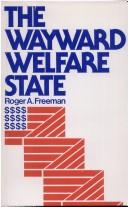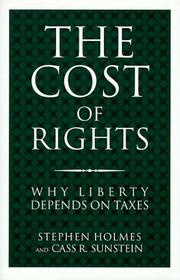| Listing 1 - 10 of 15 | << page >> |
Sort by
|
Book
ISBN: 0471361836 9780471361831 Year: 1970 Publisher: New York Wiley
Abstract | Keywords | Export | Availability | Bookmark
 Loading...
Loading...Choose an application
- Reference Manager
- EndNote
- RefWorks (Direct export to RefWorks)

ISBN: 0817974911 9780817974916 Year: 1981 Volume: 249 Publisher: Stanford, Calif. Hoover Institution Press
Abstract | Keywords | Export | Availability | Bookmark
 Loading...
Loading...Choose an application
- Reference Manager
- EndNote
- RefWorks (Direct export to RefWorks)

ISBN: 0393046702 0393320332 9780393046700 Year: 1999 Publisher: New York London W.W. Norton
Abstract | Keywords | Export | Availability | Bookmark
 Loading...
Loading...Choose an application
- Reference Manager
- EndNote
- RefWorks (Direct export to RefWorks)
Economic analysis of law --- Human rights --- Tax law --- Civil rights --- Finance, Public --- Government spending policy --- Costs. --- United States --- Costs --- Finance [Public ] --- Liberalism --- fiscaliteit --- vrijheid --- filosofie --- mensenrechten --- Civil rights - United States - Costs. --- Finance, Public - United States. --- Government spending policy - United States.
Book
ISBN: 1607417286 161324603X 9781613246030 9781607417286 Year: 2010 Publisher: New York
Abstract | Keywords | Export | Availability | Bookmark
 Loading...
Loading...Choose an application
- Reference Manager
- EndNote
- RefWorks (Direct export to RefWorks)
Debts, Public -- United States. --- Government spending policy -- United States. --- United States -- Appropriations and expenditures. --- Government spending policy --- Debts, Public --- Political Science --- Law, Politics & Government --- Public Finance --- United States --- Appropriations and expenditures.
Book
ISBN: 1430248394 1430248408 Year: 2012 Publisher: [New York?] : Apress,
Abstract | Keywords | Export | Availability | Bookmark
 Loading...
Loading...Choose an application
- Reference Manager
- EndNote
- RefWorks (Direct export to RefWorks)
Presents an introduction to the basic principles of the federal deficit, discussing such topics as the history of public debts, the rationale for deficit spending in a recession, and arguments for and against deficit reduction.
Budget deficits -- United States. --- Debts, Public -- United States. --- Deficit financing -- United States. --- Fiscal policy -- United States. --- Government spending policy -- United States. --- Management --- Commerce --- Business & Economics --- Management Theory --- Local Commerce --- Debts, Public --- Budget deficits --- Deficit financing --- Government spending policy --- Fiscal policy --- Business. --- Management science. --- Business and Management. --- Business and Management, general. --- Quantitative business analysis --- Problem solving --- Operations research --- Statistical decision --- Trade --- Economics --- Industrial management
Book
ISBN: 1606924281 1607416735 9781607416739 9781606924280 Year: 2009 Publisher: Hauppauge, N.Y. : Nova Science,
Abstract | Keywords | Export | Availability | Bookmark
 Loading...
Loading...Choose an application
- Reference Manager
- EndNote
- RefWorks (Direct export to RefWorks)
Budget -- United States -- History. --- Finance, Public -- United States -- History. --- Government spending policy -- United States -- History. --- Budget --- Government spending policy --- Finance, Public --- Political Science --- Law, Politics & Government --- Public Finance --- History --- History. --- Expenditures, Public --- Public spending policy --- Spending policy, Government --- Budgeting --- Government policy --- Economic policy --- Full employment policies --- Unfunded mandates --- Forecasting
Book
ISBN: 022680061X 022680058X 9780226800585 Year: 2021 Publisher: Chicago : The University of Chicago Press,
Abstract | Keywords | Export | Availability | Bookmark
 Loading...
Loading...Choose an application
- Reference Manager
- EndNote
- RefWorks (Direct export to RefWorks)
Policy makers often call for increased spending on infrastructure, which can encompass a broad range of investments, from roads and bridges to digital networks that will expand access to high-speed broadband. Some point to the near-term macroeconomic benefits, such as job creation, associated with infrastructure spending; others point to the long-term effects of such spending on productivity and economic growth. 'Economic Analysis and Infrastructure Investment' explores the links between infrastructure investment and economic outcomes, analyzing key economic issues in the funding and management of infrastructure projects.
Economic development --- Government spending policy --- Infrastructure (Economics) --- BUSINESS & ECONOMICS / General. --- Development, Economic --- Economic growth --- Growth, Economic --- Economic policy --- Economics --- Statics and dynamics (Social sciences) --- Development economics --- Resource curse --- United States --- Economic conditions --- Infrastructure (Economics) - United States. --- Government spending policy - United States. --- Economic development - United States. --- United States - Economic conditions - 21st century. --- infrastructure, public-private partnerships, cost-benefit analysis, investment, procurement, expenditure.

ISBN: 0471361828 9780471361824 Year: 1976 Publisher: Santa Barbara Wiley
Abstract | Keywords | Export | Availability | Bookmark
 Loading...
Loading...Choose an application
- Reference Manager
- EndNote
- RefWorks (Direct export to RefWorks)
Public economics --- Finance, Public --- Government spending policy --- History --- 336.1 --- -Finance, Public --- -658.11 --- Cameralistics --- Public finance --- Currency question --- Expenditures, Public --- Public spending policy --- Spending policy, Government --- Economic policy --- Full employment policies --- Unfunded mandates --- Public finance, government finance in general --- -Kinds and forms of enterprise --- Government policy --- 658.11 Kinds and forms of enterprise --- Kinds and forms of enterprise --- 336.1 Public finance, government finance in general --- 658.11 --- Finance, Public - United States - History - 1933 --- -Government spending policy - United States
Book
ISBN: 1430236590 9786613351289 1283351285 1430236604 Year: 2011 Publisher: [New York] : Apress,
Abstract | Keywords | Export | Availability | Bookmark
 Loading...
Loading...Choose an application
- Reference Manager
- EndNote
- RefWorks (Direct export to RefWorks)
At the turn of this century, the American national debt stood at just under $6 trillion and the deficit at a "mere" $86 billion. Today, the national debt has topped $14 trillion, and the yearly deficit for 2011 is projected at a whopping $1.4 trillion. According to the U.S. Treasury Department's Annual Report on the Public Debt, the debt is estimated to hit $19.6 trillion by 2015. The federal government has borrowed roughly 40 percent of its total budget for the last several years, a disturbing trend that could leave the U.S. in an economic crisis. Astronomical interest payments, a debt burden to your children and grandchildren, and an increased reliance on foreign creditors are just a few of the problems. Although the U.S. has experienced soaring unemployment, stagnant production, and a crippled housing market, foremost on economists' minds are rising deficits and ballooning debt. Others feel fears of the national debt are overblown or pale in comparison to today's economic problems. This clear, concise book will give you the need-to-know on the debt. You will learn: How to calculate deficits and the national debt The history of U.S debt and its recent unparalleled growth over the years How and why the government borrows money Methods and tactics for balancing the budget The economic arguments for, and against, accruing a debt The impact of the debt on interest rates and inflation The impact of the debt on the value of the dollar and U.S. economic power This book also answers key questions: Can the government go bankrupt? Why have there seemingly been no repurcussions of the large debt to date and is that likely to change? When the interest on the debt becomes higher than the revenue of the government, what happens? And many more practical insights into the government debt controversy. Business professionals, parents, retirees, and students are all talking about the debt. This quick read will provide an understanding of the ramifications of the rising debt and what the consequences may be.
Budget deficits -- United States. --- Debts, Public -- United States. --- Deficit financing -- United States. --- Fiscal policy -- United States. --- Government spending policy -- United States. --- Debts, Public --- Budget deficits --- Deficit financing --- Government spending policy --- Fiscal policy --- Management --- Commerce --- Political Science --- Business & Economics --- Law, Politics & Government --- Management Theory --- Local Commerce --- Public Finance --- Business. --- Management science. --- Business and Management. --- Business and Management, general. --- Quantitative business analysis --- Problem solving --- Operations research --- Statistical decision --- Trade --- Economics --- Industrial management --- United States --- Appropriations and expenditures.
Book
ISBN: 1462353886 1452736057 1282106791 1451905629 9786613800145 Year: 2005 Publisher: Washington, D.C. : International Monetary Fund,
Abstract | Keywords | Export | Availability | Bookmark
 Loading...
Loading...Choose an application
- Reference Manager
- EndNote
- RefWorks (Direct export to RefWorks)
This paper empirically explores how fiscal policy (represented by increases in government spending) has asymmetric effects on economic activity at different levels of real interest rates. It suggests that the effect of fiscal policy depends on the level of real rates, since the Ricardian effect is smaller at lower financing costs of fiscal policy. Using threshold regression models on U.S. data, the paper provides new evidence that expansionary government spending is more conducive to short-run growth when real rates are low. It also finds asymmetric effects on interest rates and inflation, and threshold effects associated with substitution between financing methods.
Government spending policy -- Econometric models. --- Government spending policy -- United States -- Econometric models. --- Interest rates -- Econometric models. --- Interest rates -- United States -- Econometric models. --- Banks and Banking --- Inflation --- Macroeconomics --- Public Finance --- National Government Expenditures and Related Policies: General --- Interest Rates: Determination, Term Structure, and Effects --- Macroeconomics: Production --- Fiscal Policy --- Price Level --- Deflation --- Public finance & taxation --- Finance --- Expenditure --- Real interest rates --- Production growth --- Fiscal policy --- Expenditures, Public --- Interest rates --- Production --- Economic theory --- Prices --- United States --- Government spending policy --- Econometric models.
| Listing 1 - 10 of 15 | << page >> |
Sort by
|

 Search
Search Feedback
Feedback About UniCat
About UniCat  Help
Help News
News